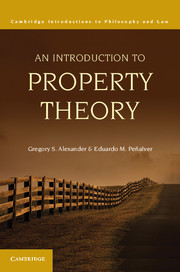7 - The Right to Exclude and Its Limits
Published online by Cambridge University Press: 05 June 2012
Summary
INTRODUCTION
“A man’s home is his castle.” We usually understand this saying to suggest that homeownership is characterized, and perhaps even constituted, by a powerful right to exclude others. But it also reflects commonly held conceptions about private ownership more broadly and its connection with the right to exclude. Are these conceptions accurate? Is the right to exclude the sine qua non of ownership, as some have argued, such that, lacking the right, there is no private property? Consider these questions in connection with the following examples, which discuss the right to exclude in several different contexts.
The Right to Exclude and the Private Home
The Jacque family owned a home on 170 acres in a rural area of Wisconsin. Steenberg Homes needed to deliver a mobile home to a parcel near the Jacques’ property, and the easiest way to get there was to cross the Jacques’ land. (There were other ways to get there, but they involved significantly more expense.) Steenberg Homes sought the Jacques’ permission to cross their land, but the Jacques refused to grant it. When Steenberg nevertheless crossed the Jacques’ land, the Jacques sued. After a trial, the jury granted, and the Wisconsin Supreme Court ultimately approved, a significant punitive damages award. Jacque seems to affirm the veracity of the notion that a man’s home is his castle, with a vengeance! But the law is more complicated than that:
In the case of fire, flood, pestilence or other great public calamity, when immediate action is necessary to save human life or to avert an overwhelming destruction of property, any individual may lawfully enter another’s land and destroy his property, real or personal, providing he acts with reasonable judgment….
If the individual who enters and destroys private property happens to be a public officer whose duty it is to avert an impending calamity, the rights of the owner of the property to compensation are no greater than in the case of a private individual. The most familiar example of the exercise of this right is seen in case of fire. The neighbors and fireman freely trespass on the adjoining land, and houses are even blown up to prevent the spread of the conflagration.
- Type
- Chapter
- Information
- An Introduction to Property Theory , pp. 130 - 155Publisher: Cambridge University PressPrint publication year: 2012



